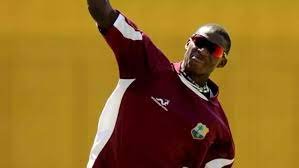In a significant development that has sent shockwaves through the cricketing world, West Indies batsman Devon Thomas has been provisionally banned by the International Cricket Council (ICC) on charges of match-fixing. The announcement was made on Tuesday, leaving fans and fellow players stunned by the allegations against the 33-year-old cricketer who has represented his country in all three formats of the game. Thomas now faces a crucial legal battle to clear his name, as the cricketing community eagerly awaits further details and the outcome of the investigation.
Devon Thomas has been charged with breaching the rules set forth by three governing bodies, including the ICC, Cricket West Indies (CWI), and the West Indies Players’ Association (WIPA). The specific details surrounding the alleged match-fixing incidents have not been made public yet, as the investigation is ongoing. However, the provisional ban indicates that the authorities have found sufficient evidence or received credible information to warrant immediate action.
The news of Devon Thomas’ alleged involvement in match-fixing has undoubtedly dealt a blow to West Indies cricket. With his experience and contributions to the national team across all formats, Thomas had established himself as a valuable asset. His suspension leaves a void in the batting lineup, putting additional pressure on the team to find suitable replacements. Moreover, this incident tarnishes the reputation of West Indies cricket and raises concerns about the integrity of the sport in the region.
Match-fixing is a grave offense that undermines the essence of fair play and erodes fans’ trust in the game. The ICC has consistently taken a tough stance against corruption, implementing stringent measures to combat match-fixing and protect the integrity of cricket. The provisional ban imposed on Devon Thomas sends a strong message that no player, regardless of their stature, is exempt from the consequences of indulging in such activities. The ICC’s commitment to investigating and prosecuting match-fixing cases demonstrates its determination to keep the sport clean.
Devon Thomas now faces a challenging legal battle to clear his name and restore his reputation. The proceedings will involve a thorough investigation, presentation of evidence, and hearings. The ICC’s Anti-Corruption Unit will work in collaboration with CWI and WIPA to ensure a fair and impartial process. If found guilty, Thomas could face severe penalties, including a lengthy ban from professional cricket, financial sanctions, and the permanent tarnishing of his career.
The alleged involvement of a prominent cricketer like Devon Thomas in match-fixing highlights the ongoing battle against corruption within the sport. This incident underscores the need for increased transparency, vigilance, and education regarding the perils of match-fixing. Cricket authorities must work collaboratively to enhance anti-corruption measures, educate players about the consequences of their actions, and establish strict protocols to identify and address potential instances of corruption in cricket.
While the allegations against Devon Thomas cast a shadow over West Indies cricket, it is essential to remember that the actions of one individual do not define an entire team or the sport as a whole. Cricket has weathered similar storms in the past and emerged stronger by implementing robust anti-corruption mechanisms. The cricketing community, fans, and governing bodies must rally together to rebuild trust, reaffirm their commitment to fair play, and protect the integrity of the game.
The provisional ban handed to Devon Thomas for alleged match-fixing serves as a stark reminder of the persistent threat posed by corruption in cricket. The investigation into his case will shed light on the specific details and determine the appropriate consequences if the charges are proven. As the legal battle unfolds, it is crucial for cricket authorities to strengthen anti-corruption measures, educate players, and foster a culture of integrity. This incident provides an opportunity for the cricketing community to reaffirm their dedication to fair play and work collectively to safeguard the future of the sport.


